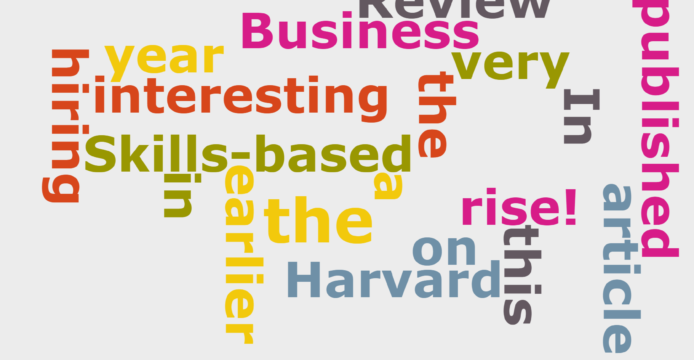In a very interesting article published earlier this year in the Harvard Business Review, three academics from the prestigious American University are discussing the results of a study that covered more than 50 million recent job announcements. The authors conclude that many companies are moving away from degree requirements and toward skills-based hiring, especially in middle-skill jobs, which is good for both workers and employers.
The academics were inspired to do research on this issue because they have observed that: “Early in the 2000s, a significant number of employers began adding degree requirements to the descriptions of jobs that hadn’t previously required degrees, even though the jobs themselves hadn’t changed. The trend — sometimes known as “degree inflation” — became particularly pronounced after the Great Recession of 2008-2009, at which point leaders in government, business, and community-based organizations recognized that a reset was in order. Many large corporations soon announced that they would eliminate degree requirements in much of their hiring.” They tried to find if the reset in “degree inflation” brought concrete results.
One of the reasons for the fall of degree requirements was the pandemic. The authors of the research note that “Desperate to find skilled workers during the pandemic, which has been the biggest health crisis of modern times, many employers have been willing, at least temporarily, to forgo degree requirements for many jobs. In job announcements for intensive-care and critical-care nurses, for example, the share of postings asking for a bachelor’s degree declined by 12 percentage point between 2019 and 2020, from 35% to 23%. Degree requirements for registered nurses fell by a more modest 5 percentage points. Overall, we observed this pandemic-related reset in roughly 548,000 job postings, involving 27% of middle- and high-skill occupations. The shift may reflect only a temporary accommodation in the face of an emergency, which is why we consider it a cyclical rather than a structural reset, but nonetheless, given its scale, it’s likely to teach us a lot about whether workers who have degrees actually perform better than newly hired workers who do not. Previous research suggests that performance differences are often marginal outside specific fields such as professional services and finance.”
But the pandemic was not the only reason for focusing on skills rather than on degrees. The three academics observe that when demand for talent is much bigger than the talent available employers give less importance to degrees. They note that this “became increasingly apparent during the tight employment market of the late 2010s. Between 2017 and 2019, employers reduced degree requirements for 46% of middle-skill positions and 31% of high-skill positions. Among the jobs most affected were those in IT and managerial occupations, which were hard to fill during that period. The essence of the structural reset is this: In evaluating job applicants, employers are suspending the use of degree completion as a proxy and instead now favor hiring on the basis of demonstrated skills and competencies. This shift to skills-based hiring will open opportunities to a large population of potential employees who in recent years have often been excluded from consideration because of degree inflation.
The conclusion of the authors is particularly interesting : “The reset that’s taking place in hiring today is vitally important. If we want to increase equity in the labor market, one important way to do it is by removing barriers to well-paying jobs — and there’s no question that in recent years one of those barriers has been inflated degree requirements. All companies have different needs, of course, but as they write job descriptions and assess candidates they should carefully assess the value of the blunt and outdated instruments that they’ve been using, and the assumptions they’ve been making. A successful reset will represent a win-win: Previously overlooked workers will be able to pursue attractive career pathways even without a four-year degree, and companies will be better able to fill jobs that need filling.“

